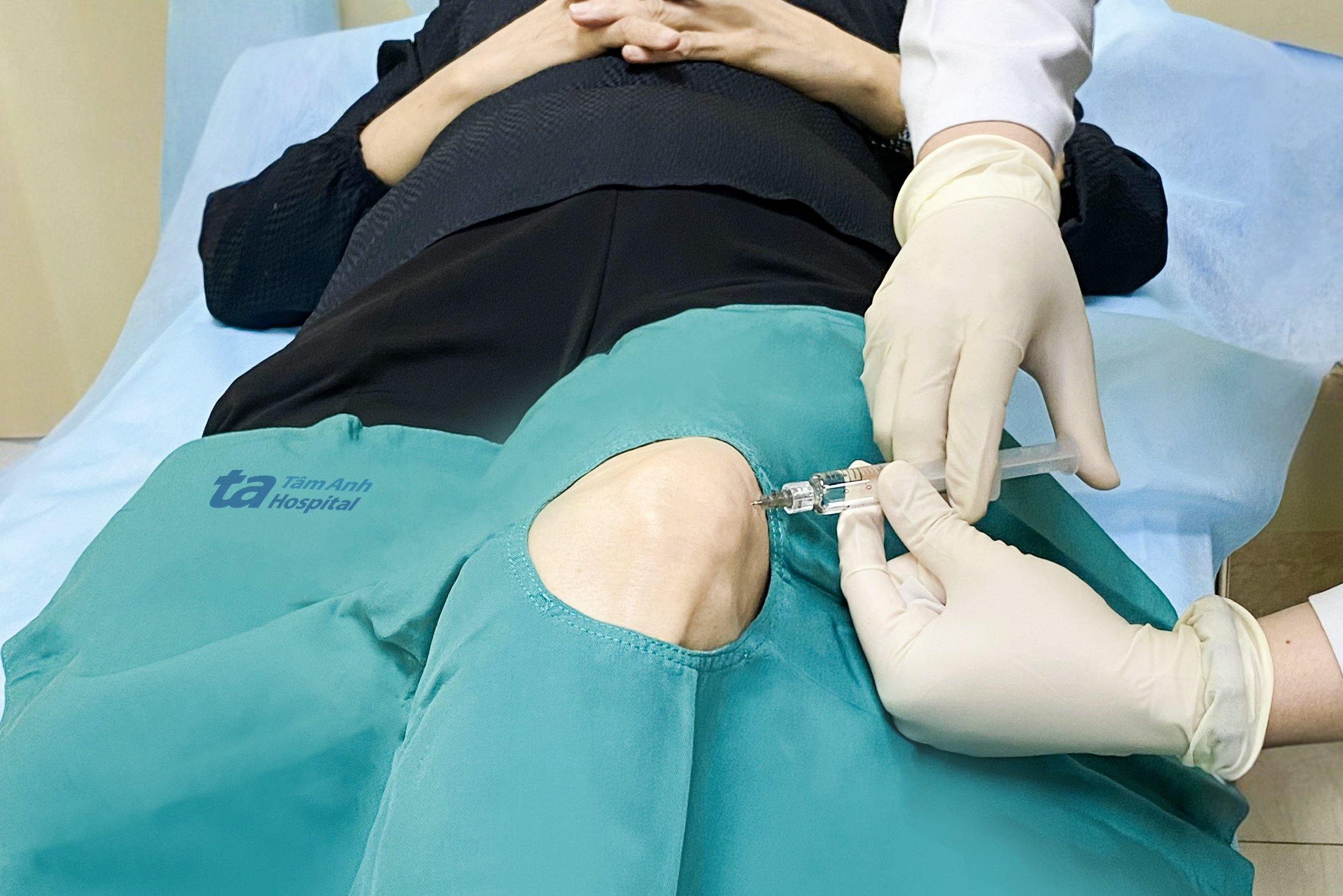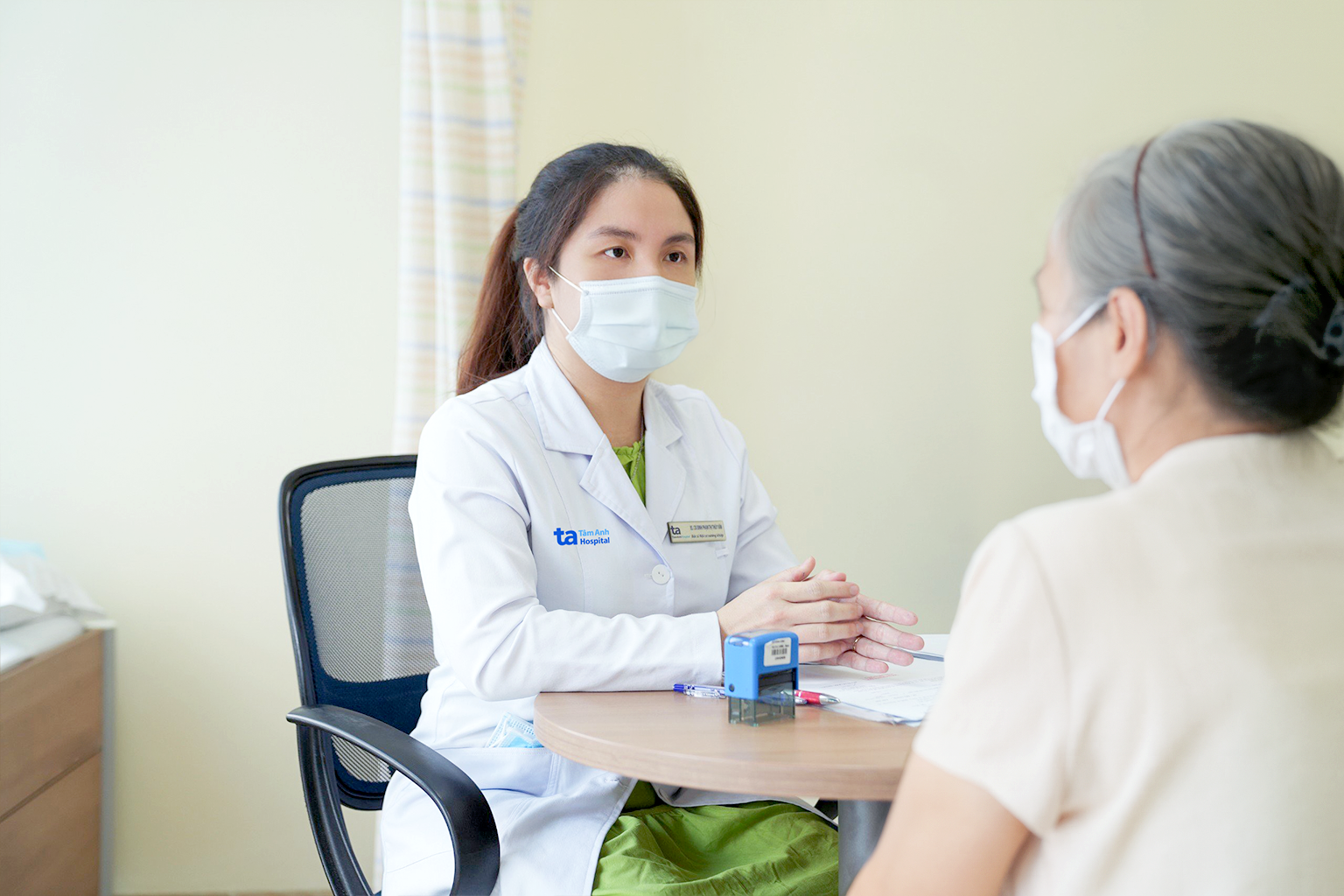Dr. Dinh Pham Thi Thuy Van, from the Musculoskeletal Internal Medicine Department at Tam Anh General Hospital in Ho Chi Minh City, issued the above warning, explaining that joint and tendon injections involve delivering medication directly into the affected joint or tendon via a small needle. This aims to reduce inflammation, pain, and stiffness; improve mobility; and limit side effects on the entire body. This method requires a specific doctor's prescription and is typically used when other medical treatments are ineffective.
Commonly used medications include corticosteroids, hyaluronic acid, and platelet-rich plasma. Each medication has different effects and dosages. Overuse prevents the joint from having time to regenerate and recover. For example, corticosteroids typically provide relief for 2-3 months and are injected a maximum of three times a year. Repeated injections can damage cartilage and increase the risk of joint infection.
 |
A doctor administers a joint injection to treat pain and osteoarthritis in a patient's knee. Photo: Tam Anh General Hospital |
A doctor administers a joint injection to treat pain and osteoarthritis in a patient's knee. Photo: Tam Anh General Hospital
Dr. Van reported that the hospital has recently received numerous emergency cases due to joint injection overuse. One patient, 73-year-old Mrs. Hanh, who suffered from knee osteoarthritis, experienced severe swelling, redness, and difficulty walking after several injections at a clinic. Tests on her knee fluid revealed acute inflammation, with elevated white blood cell counts and inflammatory markers in her blood. After more than 7 days of hospitalization, the inflammation, swelling, and pain in her knee subsided, her blood markers improved, and she regained mobility.
Similarly, Mr. Dien, 64, experienced mild fever, swelling, pain, and limited shoulder movement 10 days after a joint injection. Blood tests and an MRI scan indicated an infection. He received antibiotic treatment, and after 10 days, his swelling and pain decreased, and his shoulder movement improved.
"Not every patient's physical condition or musculoskeletal issue is suitable for joint injections," Dr. Van stated. Before the procedure, patients must undergo a thorough examination and have any underlying conditions stabilized. Joint injections are contraindicated in cases of infectious arthritis, skin infections near the injection site, joint damage due to vascular or neurological diseases, and compromised immune systems.
The injection process must be performed under sterile conditions by a qualified physician to prevent bacteria from entering the soft tissue via the needle. This can cause local inflammation and infection or enter the bloodstream, leading to sepsis and increasing the risk of septic shock and death. If the injector lacks proper technique and anatomical knowledge, complications such as intra-articular bleeding, accelerated joint degeneration, adhesion of tissue around the inflamed tendon, tendon atrophy, tearing, rupture, or muscle atrophy can occur if the injection mistakenly hits a tendon or muscle.
Patients who receive joint injections must adhere to the lifestyle, exercise, and work regimens prescribed by their doctor. After the injection, the absence of pain can lead to complacency in daily activities. Continuing harmful postures, such as squatting or sitting cross-legged, can worsen the condition.
 |
Dr. Van assesses Mrs. Hanh's recovery during a follow-up appointment. Photo: Tam Anh General Hospital |
Dr. Van assesses Mrs. Hanh's recovery during a follow-up appointment. Photo: Tam Anh General Hospital
Tam Anh General Hospital in Ho Chi Minh City performs hundreds of joint and tendon injections weekly. Common injection sites include the knees, shoulders, and tendon attachments. Dr. Van advises patients to seek consultation, diagnosis, and appropriate injection procedures at specialized orthopedic facilities for safe treatment. Depending on the medication, patients should remain at the hospital for 30 minutes to an hour after the injection for monitoring. After returning home, they should be aware of warning signs and seek medical attention promptly if any arise.
Patients with osteoarthritis or joint pain should adhere to their doctor's treatment plan, which may include medication, injections, or surgery. Typical symptoms requiring prompt medical attention include joint pain and stiffness, swelling and warmth, difficulty walking, clicking or crackling sounds in the joint, and numbness or weakness.
Phi Hong
| Readers can submit questions about musculoskeletal diseases here for doctors to answer. |












